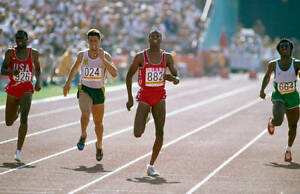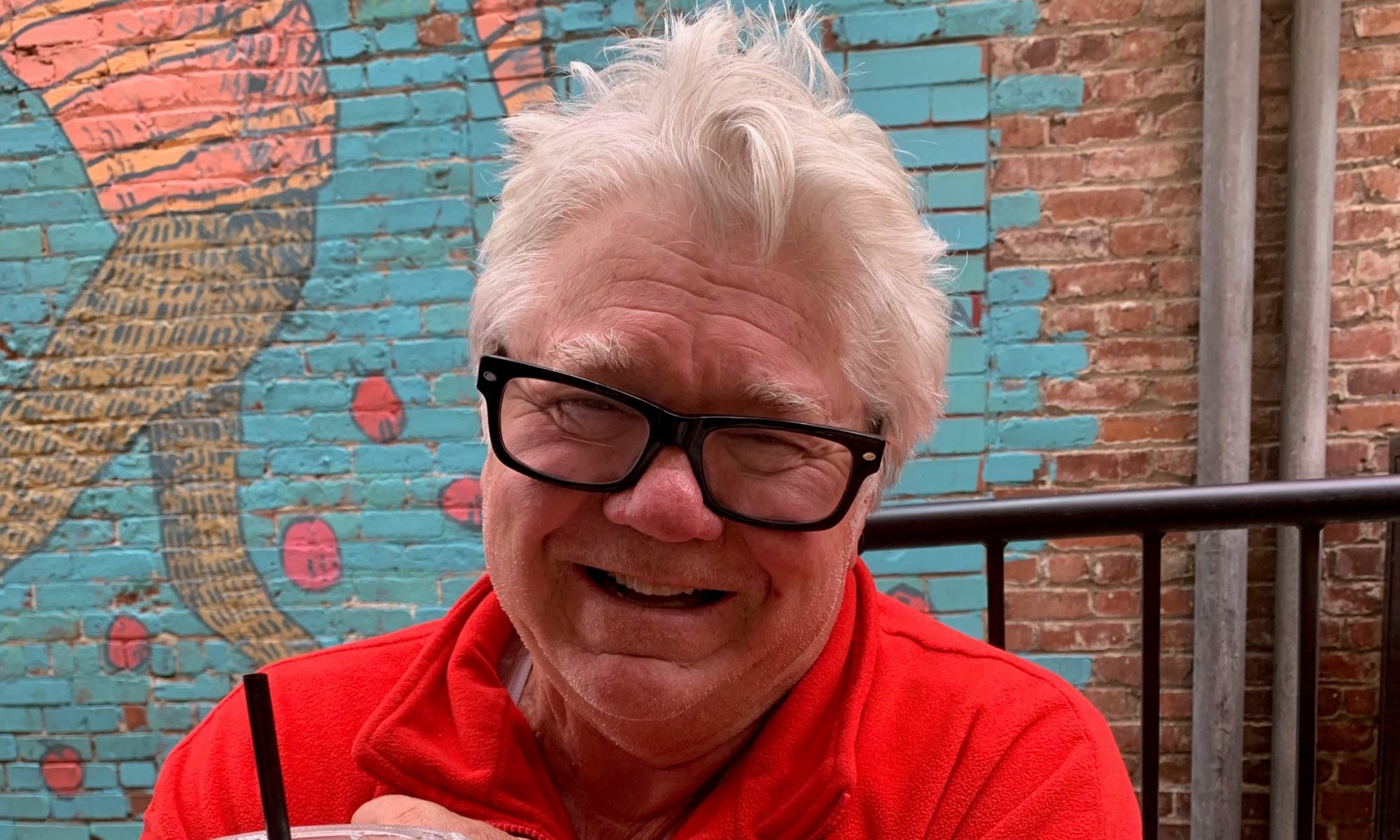A Redlands Connection is a concoction of sports memories emanating from a city that once numbered less than 20,000 people. From pro football’s Super Bowl to baseball’s World Series, from dynamic soccer’s World Cup to golf’s and tennis’ U.S. Open, major auto racing, plus NCAA Final Four connections, Tour de France cycling, more major tennis like Wimbledon, tiny connections to that NBA and a little NHL, major college football, Kentucky Derby, aquatics and Olympic Games, that sparkling little city sits around halfway between Los Angeles and Palm Springs on Interstate 10. Imagine an all-out Olympian track preview in a non-televised, late-night, all-out race at the University of Redlands.
REDLANDS — Innocent Egbunike was racing Alonzo Babers in one final lap that capped a nine-hour collegiate track & field meet.
Here. In Redlands, spring 1983.
A year later, a little over an hour away, those guys would be racing in a Los Angeles Olympics championship.
Who could’ve believed that Babers, running for Air Force Academy, or Egbunike, an Nigerian running for Azusa Pacific University, would go up against each other again? Twice, in fact at those L.A. Games.
At Redlands, a meet involving an Oregon State runner, plus 17 small college programs on a dirt track surface, not a soul present could predict that 1984 Olympic 400-meter finale.
No one!
At Redlands, that 4×400 relay involved Babers getting beat to a finish line by Egbunike. A lengthy schedule of track & field events was capped by a pre-Olympic showdown.
A year later, Babers raced for the Americans, Egbunike for the Nigerians – a rematch between those two racers.

That 1983 spring at smallish University of Redlands, an NCAA Division III member, hosted its annual Track & Field invitational. It attracted a number of small college squads, though that couple of interesting programs showed up.
Azusa Pacific, coached by top dog Terry Franson, would win that year’s NAIA team championship in June, was Redlands.
So was U.S. Air Force Academy, coached by Ernie Cunliffe.
That Redlands-based meet featured men’s and women’s events – jumping, any throws like a discus, shot put, pole vaults, or plenty of conceivable distance races, plus sprints and relays – took nine hours to complete.
When that meet-concluding relay took place, it was close to 9 p.m. Consider it was 11 a.m. when this meet began!
There they were, Azusa Pacific University squaring off against the U.S. Air Force Academy team in that 4 x 400 men’s finale.
It would be memorable, especially since 1980 Nigerian Olympian, Egbunike, would be racing APU’s anchor lap.
His opponent, Babers, a lieutenant in the USAF, still holds his school’s indoor 400 (46.86) record from 1982.
Throw this in: In that 1983 season, Babers ran 45.36, his school’s outdoor mark for years. He took fourth (45.51) at the NCAA Division I finals later that June.
Against much easier competition at the NAIA finals, Egbunike sprinted to national championship wins in the 100 (10.34), 200 (20.94) and anchored the winning 4 x 400 relay – John Shalongo, Doug Laisel and Ted Campbell, plus this Nigerian, in 3:09.77.
*****
At the Redlands Invite, Egbunike’s Azusa Pacific teammate Mike Barnett, a future Olympian, ripped off a winning 275-foot javelin mark – still the Ted Runner Stadium record – on that day.
Oregon State’s Mark Fricker, from nearby Hemet, posted a still-existing 5,000-meter record of 14:09.30 on that 1983 spring date.
USAF’s Bret Hyde, a winner at Redlands, still holds his school’s mark over a 3,000-meter steeplechase (8:31.87). Hyde, incidentally, also placed at the 1984 L.A. Olympics Games.
For good measure, APU sent discus and hammer competitor Christian Okoye, that future NFL “Nigerian Nightmare” with Kansas City. Before that, in this same Redlands stadium, Okoye terrorized that home football team.
There was even a Redlander on the USAF women’s squad, NCAA Division II All-American Laureli Mazik, who won that day and stands on the school’s indoor mile (4:53.9) all-time list at No. 9.
She’s USAF’s No. 16 outdoors (4:32.09).
All of which is a reminder how relevant this Redlands Invitational seemed at that moment.
There were loads of moments.
*****
By race time, hardly anyone remained inside at that Redlands-based Ted Runner Stadium’s grandstand.
It was late, after 9 p.m. Interest had long since waned when most events were finalized. Most participating teams had long since departed for their own Southern California campus.
A few teams remained, including Azusa Pacific and Air Force.
When those batons were exchanged for that memorable 4 x 400 anchor lap, Egbunike and Babers were in full stride. That duo raced side by side for their entire 400-meter run.
At the midway mark, Egbunike and Babers were seen slightly bumping during that classic one-on-one duel.
APU’s sprinter edged USAF’s officer, though each runner had plenty of season left – Egbunike in NAIA’s lower level ranks while Babers had top NCAA runners like Bert Cameron and Antonio McKay to square off against later that season.
It was that very season when Babers ran a third leg with Ted Holloway and Todd Scott, Rick Goddard anchoring, setting their school record (3:10.11) – currently the school’s eighth best.
Babers still holds the school mark over 500-meters, a discontinued event in which he posted a 1:01.7.
All of which was just preparation for those 1984 Los Angeles Olympics. He came up against Egbunike one more time.
At Redlands, that Nigerian Olympian, escorted to his final handoff by Shalongo, Laisel and Campbell, got his triumph over Babers. Their real race was over a year away.
*****
In fact, there were two events in L.A.
Inside that Los Angeles Coliseum, both wound up in their open 400-meter finals. There was plenty of buildup, much of the spotlight falling on Antonio McKay, that year’s NCAA champion.
Babers prevailed over McKay. Egbunike? Finished last in that seven-man finale.
As for the 4 x 400 relay, Babers needed McKay’s help. Those two were mixed in with a lineup that included Ray Armstead and Sunder Nix. The USA won a gold medal ahead of Great Britain (silver).
Third place? A bronze medal? Egbunike? Nigeria? Egbunike and his three running mates, Rotimi Peters, Moses Ugbusien and Sunday Uti showed their world class brilliance.
Unlike that Redlands finale, it was Egbunike against McKay in that final lap. Babers took a 7-meter lead after his third portion of that relay, handing off to McKay.
Beyond that bronze medal, Nigeria got another consolation – an African continental record.
Imagine those men shined at Redlands.
*****
While training for and competing in the 1984 Olympics, Babers held the rank of lieutenant. Just one month after his double-gold performance in Los Angeles, Babers reported to flight training school and began his career as a pilot. His athletic career was over. He was an active duty officer in the United States Air Force from 1983 to 1991, continuing to serve as a member of the Air Force Reserves. As of 2019, he was a 777 pilot for United Airlines.
Egbunike? As head coach of Nigeria’s 2008 Olympic team, he was assistant coach in 1996 and 2000. Egbunike appeared in the winner’s circle again, having coached gold medalist Angelo Taylor, 400-meter Olympic champion in both 2000 and 2008.
Ultimately, Egbunike took over Pasadena City College as its coach – a campus located just a few miles from those Azusa Pacific digs.
Cunliffe, Babers’ coach, chuckled a little, but sounded super serious at Redlands in that 1983 matchup, “He was a reject from football when I first met him,” he said. “I didn’t know who he was.”
Later, Cunliffe discovered exactly that athlete from Montgomery, Alabama .
Quotes at Redlands? Yes, I was there to write it up for a local newspaper. If I’d known they were each headed for Olympics a year later, I’d have stood up for post-race quotes even more.
Babers shook his head, breathing hard after his race. No real quote, except this: “I’ve got to get better.”
Egbunike, a Nigerian, said very little. Nodding, seemingly satisfied, that smallish man said, “I could get better.” I walked away thinking that, perhaps, a Nigerian might not have understood English very well. I was dead wrong.
Neither man answered questions about that minor bump halfway through that final lap in Redlands.
Me? I had no idea that both of these guys would wind up as 1984 Olympians.
Those two world-class speedsters brought an Olympic showcase to Redlands in March 1983.
